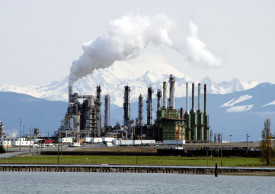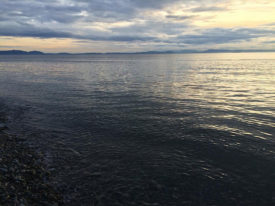Amidst the slavering cries to drill pretty much everywhere, it’s encouraging to hear the news from Oregon. The state’s Department of Fish and Wildlife has just finished accepting proposals for new marine reserves—protected places where Oregon’s maritime ecology can thrive.
A coalition of conservation leaders has developed an ambitious and smart proposal. Now it’s up to the state’s elected officials to make it real.
Strangely—and partly by reason of historical accident — Oregon is something of a laggard in marine protection, at least relative to its West Coast neighbors. Washington has many reserves scattered around its inland saltwaterways plus the vast Olympic Coast National Marine Sanctuary, which extends out to sea from Olympic National Park. British Columbia, Alaska, and Hawaii all have taken bold steps to preserve marine ecology. And California is now aggressively developing an extended network of protected areas. Oregon should too. After all, this is a state with a jaw-dropping coastal landscape and a population that cherishes it.
There are obvious environmental benefits to marine protection and some less obvious economic ones. If fish stocks are given a space to replenish themselves, they can produce more bountifully. And that can mean heading off disastrous fishing years like 2008. And that, in turn, means more tasty local wild salmon on my barbeque.
Apart from making a plea for my summer grilling, I don’t have a lot to add here. Except this: a forward-looking approach to ocean protection could be huge. It could earn Governor Kulongoski a place in the pantheon of great Oregon conservation leaders—making him an aquatic version of Tom McCall.
Media coverage from Oregon Public Broadcasting here, the Oregonian here and here; and a press release from Our Ocean here.









SF
You might be able to make a credible case that reserves would increase the long-run population of bottom fish, But not for salmon, which are migrants living for only a short period in reserves. A more sensible proposal would be to close reserves to bottom fishing but open them to salmon trolling in good years. Ocean temperatures and fresh water habitat are the main limiting factors for salmon populations.
Eric de Place
That’s a fair point, SF. That’s what happens when I write blog posts after too much wine! Still, my larger point stands: there are economic benefits to marine reserves, one of which is that they can boost fishing harvests.
VI
My question/comment/observation brings in yet another species. I know that there is a considerable dungeness fleet out of Ilwaco at Cape Disappointment, and there seems to me to be considerable harvest elsewhere in Washington. To what extent does this activity extend southward, and, as scavengers and bottom feeders, to what extend would cancer magister populations (and hence harvests) be strengthened by new marine protection?
Bob Smith
And what specific crisis level problem would this solve….other than create new fed and state bureaucracies to siphon $ from the productive side of our society to the non-productive?